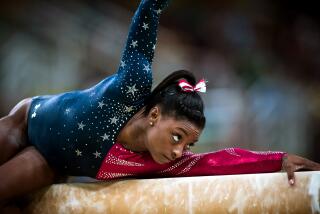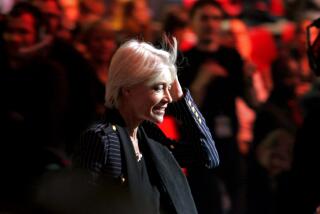Ordinary in an extraordinary way
- Share via
It is a bad world in which to be an almost 50-year-old virgin, unemployed, with frizzy hair, midriff bulge and a figure like a spinster teacher from the 1940s. In the international world of televised talent shows, you’re simply not supposed to appear on stage if you look like that. Talent is nice, but it must be packaged, matched by a certain, shall we say, physical ability to seduce. In the entertainment world these days, if you have to choose, talent runs second to “dateability.”
So if you look anything like Susan Boyle, the Scotswoman who is the latest Internet phenomenon for her performance of “I Dreamed a Dream” on a British TV talent show, you’re at least supposed to get a stylist who can do something for you before you go on. And preferably, if you’re going to look like that and be in public, you should be a commentator on economic matters in the Third World or a former secretary of State or an expert on the human genome. You should be Doris Lessing sitting on the stoop in a denim skirt and sensible shoes, getting a Nobel Prize for literature.
You should not be a torch singer.
Unless, of course, you’ve been selected to be made fun of.
When I first saw the Susan Boyle clip from “Britain’s Got Talent,” I was confused. Was she a fake? Was this a hoax? She seemed just a step over the line, just a little too ridiculous.
That dress; it looked vintage, but like vintage from her mum’s closet. Only someone who was proclaiming her intense geekhood would wear that dress on an “American Idol”-style show. Only someone who was either mocking herself or who was an actress pretending to be a Susan Boyle type of person.
Or worse. I was suddenly dumbstruck: Could this be John Cleese’s latest cross-dressing foray? It had all the earmarks of Monty Python. An unmarried lady. Of a certain age. From Scotland. With a funny accent. Wiggly hips. An abstracted air. A cat named Pebbles. I knew it: Susan Boyle was Basil Fawlty in one of Sybil’s more outre outfits.
Or even worse. Photos could turn up of Boyle -- her third husband on her arm -- swanking about the clubs of West Lothian in tightfitting lame and false eyelashes, her blond locks piled on top of her head.
But at this point, she seems just a decent sort from a village far from London, a perfect target for the rolling-eyed dismissal and snickering revulsion of the sleek-haired, skinny-armed dieting classes. You saw them there in the audience, all the young women ready to laugh at the old bag -- you have to wonder what would happen to Ella Fitzgerald on the new talent shows -- and already laughing at Boyle before she’d half begun.
Boyle was something they’d never seen before in such a setting: a person whose every turn and twist, every statement and giggle and shake of her chin proclaimed her solid standing in the middle class.
But strangely, Boyle’s virginity and double chin and piano legs and fright-wig hair and bad fashion worked for her: One thing to look like Beyonce and sing like a honey, another to look like Maude or Hazel or Roseanne and sing as if God had taken you over. The human mind loves contrast; the human mind loves a surprise.
Susan Boyle knew just what she was doing.
She began to sing. It was quite a moment. It was a song about wasted youth and lost dreams, a choice made by a singer who knew exactly what she should sing. It was like the dying Piaf singing “Non, Je ne Regrette Rien.” It was as stirring a moment in the history of song as the singing of “La Marseillaise” in “Casablanca” (well, almost). And yet, painfully, as we were moved by the singer and the song, we were also forced to watch the reaction shots of the audience and of Amanda, the perfect-haired, sleeveless, highly “dateable” judge, whose pouts and warm surprise and welling tears filled almost as much screen time as Boyle’s astounding performance.
“We are too cynical,” Amanda said, addressing Boyle after her performance. “Everyone was rooting against you.” It was as if Amanda expected this one moment where art conquered all, where the sincerity of song and execution softened every heart, to allow us to believe we had somehow been purged of all our cheap, superficial ways. Susan sang, and shrugged her shoulders and tossed her gray locks, and now we were changed, changed utterly by this transforming performance. Now Piers and Simon and Amanda and you and me, we were all going to move forward with openness and acceptance in our hearts for all kinds of people in all kind of packages. As if by approving of this one dorky but brilliant outsider, this world would be granted forgiveness for all the meanness, bullying and tawdry acceptance of the third rate that is its usual fare.
But instead of changing us, Susan Boyle’s explosion into fame is much more likely to change her. Already she has appeared on Scottish television with her hair seemingly darkened and somehow forced into submission. Please please please, Susan! The vintage women of the world beg you: Don’t lose a pound. Don’t buy a new wardrobe. No highlights! No Botox! Don’t touch chin one, or chin two.
Remember Ella Fitzgerald, and just keep singing.


